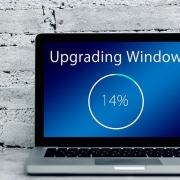The cost of not having reliable backups?
The cost of not having reliable backups?
By Jeandre de Beer updated by Emile Greyling
 We all spend a great amount of time on our computers for important personal or business dealings. There are so many stories of people who have lost all of their files due to system crashes or computer viruses.
We all spend a great amount of time on our computers for important personal or business dealings. There are so many stories of people who have lost all of their files due to system crashes or computer viruses.
Backups must be an essential part of your to-do list. It is imperative to store your important files in a separate location from your computer.
If you have reliable backups and your computer crashes or become infected with a virus that results in a loss of files, you will still have access to your files on backup disks which you can then restore.
Do I really need backups?
Do not fall into the trap of thinking that data loss will never happen to you. Data loss happens more regularly than you think.
Imagine for a moment that one day you go to work to find that all your company data – meaning your email, your Word and Excel documents, PDFs, databases, contact lists, accounting data, billing information, etc. – has simply vanished, permanently.
Gone is everything that makes your company what it is and that has allowed it to operate and grow as a business.
How will your company recover? Are you going to recreate years worth of data in a few months, while trying to support and manage your current business obligations?
What is the real cost of not having backups?
According to the London Chamber of Commerce for most businesses, small, medium or large, this will probably be too much to bear – 90% of all companies that suffer a major data loss go out of business within two years.
This helps us to understand how important reliable backups are.
A business that does not maintain a copy of its data is risking it all. It is extremely easy to lose data and it is almost impossible to rebuild that data if backups don’t exist.
Are you backing up your data regularly?
Backups should be given as much importance as the overall protection of the organization’s network.
Permanently losing data is a completely preventable disaster, all it takes is a backup and recovery strategy.
Most businesses recognize the importance of having backups. A recent survey of small and medium-sized enterprises rated backup as their second highest computing priority, after protection against viruses and other malware.
Yet nearly one-third of small and medium-sized enterprises surveyed do nothing to back up their data.
Some companies do have backup processes in place, but they often create a false sense of security. The survey found that 92% of companies have deployed some form of data backup procedures, yet 50% of them have lost data.
Of the companies that lost data, approximately one-third lost sales, 20% lost customers, and 25% claimed the data loss caused severe disruptions to the company.
Do not make these 6 mistakes…
1. Being Complacent
Again, do not believe that you are immune to data loss. A prime reason that companies don’t have backup strategies is that they can’t bring themselves to believe that they can suffer a data loss.
Maybe you have not lost data in the past – but do not think that it cannot happen in the future.
2. Not making regular backups
Roughly one-third of companies does not have a backup strategy in place. For many that do, the words “thorough”, “reliable” and “complete” do not define their data backup strategy.
Some backup their hard drives once a week, if they remember and then they only backup files they can quickly think of.
3. Relying on employees
In many businesses, critical data are often stored on individual employees’ desktops or laptops. This data, which can range from confidential information to project plans to critical correspondence are typically not backed up.
Instead businesses rely on employees to backup their own data, usually without direction or advice. The result is more often than not, that backups don’t take place in which case a failed hard drive or stolen laptop can spell utter disaster to a business.
I have heard on several occasions that managers say that we do not need to backup user’s computers – since that is their own responsibility. They have discussed this with their staff – and if the staff does not make backups it’s their responsibility to recover the lost files in their private time. though this is not possible and ends up costing companies dearly.
4. Keeping backups on-site
A backup plan is only as good as your ability to recover the data, and one of the most common mistakes is to store the backup at the same location as the original data.
If there is a fire, natural disaster, break-in or a malicious employee, not only is the data lost but the backup as well.
Always make sure that your backups and live data is stored at different locations whether it be physical or online.
5. No budget to do backups
Some businesses, while happy to agree that the idea that a good backup strategy is essential, fails when it comes to providing the necessary resources.
Sometimes the reason is cost, other times it is because of “more pressing” tasks to attend to. This reasoning is wrong – think about the cost of losing all your business critical data.
Rudimentary but complete backups do not cost much time nor money.
6. Not testing the integrity of your backups
One more oversight that can lead to permanent data loss is not testing the ability to recover data. Backups are only as good as the ability to recover data from them.
Unless you regularly confirm the reliability of the backups – including the ability to recover lost data by restoring the backup, your strategy may be worth much.
Yet despite this, 34% of companies NEVER test their backups and 77% of those who have tested their backups have discovered that their backups failed (US Department of Trade & Industry).
Just making backups and hoping for the best is not enough.
So what makes an effective data backup strategy?
An effective data backup plan consists of five parts:
1. What needs to be backed up?
Decide what data needs to be backed up and where these backups will be kept for safe keeping. Store a full backup at another location or online to protect against fire, theft or other disasters.
If the data is critical, it may be a good idea to have a quarterly and yearly backup as well, so that you can recover files that may have been deleted, but not discovered until months later.
2. Design a backup routine
Make backing up a part of the normal scheduled daily tasks. Assign a specific person for this important task.
Wherever possible, automate the backup process and make sure that the person responsible for checking the backups are doing this regularly.
3. Customize the backup strategy to fit your business needs
To determine the best schedule for data backup, it is important to know how often the data changes. If data changes weekly, a daily backup might be overkill. If there is critical data that updates every hour, it may be necessary to back up several times a day.
Full backups can be supplemented by incremental backups. An incremental backup will only back up files that have changed since the last full backup and is normally much quicker than a full backup.
Keep in mind that the safest way to do backups is to select a full backup each time.
4. Test the backup
To ensure that backups are reliable you need to test the backup jobs by attempting to restore them to an alternate location. This will bring out any flaws or corrupt data before it is too late.
Most backup applications also have a “backup log” or generate a “backup report” that can quickly identify any problems or skipped files in the backup job. Be sure to review these logs every time backups are done.
Do not solely rely on these logs – restoring your backups is still the only way to make sure that they are reliable.
5. Have at least three different backups of data
A backup is more than simply moving email, financial documents or other important files to an external hard drive. Simply moving data from one location to another isn’t giving you any extra protection in case disaster strikes.
If there aren’t at least two separate copies of your data, it isn’t a backup at all.
While a single backup may be a good start, there is still some risk for data loss, especially if both copies are kept in the same location.
The best protection against data loss is having at least three copies of your data (the original files, an easily-accessible backup and an archived copy).
Summary
Any business needs to have an effective backup strategy to guard against inevitable data loss. Given the overall negative impact permanent data loss can have on a company, including bankruptcy, a data backup and recovery strategy that is effective is essential.
Most businesses do not have the time to design an effective backup strategy. Backups are usually not very high on our to-do lists until disaster strikes.
Do not procrastinate – make sure that your data gets backed up and that the backups are reliable. If you feel that you cannot manage this important task in-house you can contact us to assist you with your backups.
 IT Experts are specialists in this field. Contact us for any assistance that you need.
IT Experts are specialists in this field. Contact us for any assistance that you need.
In a matter of minutes we can remotely log into your computer – safely and securely – to assist you with any issues you might experience.
What is remote support? Click here to find out.













Leave a Reply
Want to join the discussion?Feel free to contribute!